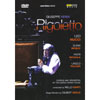Verdi Rigoletto
A veterans’ night out for star and conductor in a fancy-dress Rigoletto
View record and artist detailsRecord and Artist Details
Composer or Director: Giuseppe Verdi
Genre:
DVD
Label: Arthaus Musik
Magazine Review Date: 3/2008
Media Format: Digital Versatile Disc
Media Runtime: 128
Mastering:
Stereo
DDD
Catalogue Number: 101285

Tracks:
| Composition | Artist Credit |
|---|---|
| Rigoletto |
Giuseppe Verdi, Composer
Angela Kerrison, Countess Ceprano, Mezzo soprano Boguslaw Bidzinski, Borsa, Tenor Elena Mosuc, Gilda, Soprano Giuseppe Verdi, Composer Katharina Peetz, Maddalena, Contralto (Female alto) Kismara Pessatti, Giovanna, Soprano László Polgár, Sparafucile, Bass Leo Nucci, Rigoletto, Baritone Morgan Moody, Count Ceprano, Bass Nello Santi, Conductor Piotr Beczala, Duke, Tenor Rolf Haunstein, Monterone, Bass Valeriy Murga, Marullo, Baritone Zurich Opera House Chorus Zurich Opera House Orchestra |
Author: John Steane
The Gilda, Elena Mosuc, suits well in voice and appearance, her “Caro nome” sung with a winning gentleness if with a suspicion of self-regard, confirmed as at its conclusion she ceases to be Rigoletto’s daughter and delightedly acknowledges the audience’s applause. Piotr Beczala is a splendid Duke, strengthening the estimate we already have of him as being currently among the best of our lyric tenors. László Polgár, another veteran, appears hardly to have aged vocally at all, his dignified bearing placing this Sparafucile in the aristocracy of assassins. In the pit, or rather standing precipitously high above it, is Nello Santi, father of all, who made his debut with this same opera as a promising 20-year-old in 1951.
Gilbert Defoe, the stage director, creates a strong initial impression of originality by setting the Mantuan court in the period originally intended. Monterone, however, appears in 19th-century costume, and so hereafter does everybody else. It seems we must suppose that in the first scene the Duke was throwing a party in fancy-dress. “You know it makes sense.”
Discover the world's largest classical music catalogue with Presto Music.

Gramophone Digital Club
- Digital Edition
- Digital Archive
- Reviews Database
- Full website access
From £8.75 / month
Subscribe
Gramophone Full Club
- Print Edition
- Digital Edition
- Digital Archive
- Reviews Database
- Full website access
From £11.00 / month
Subscribe
If you are a library, university or other organisation that would be interested in an institutional subscription to Gramophone please click here for further information.




